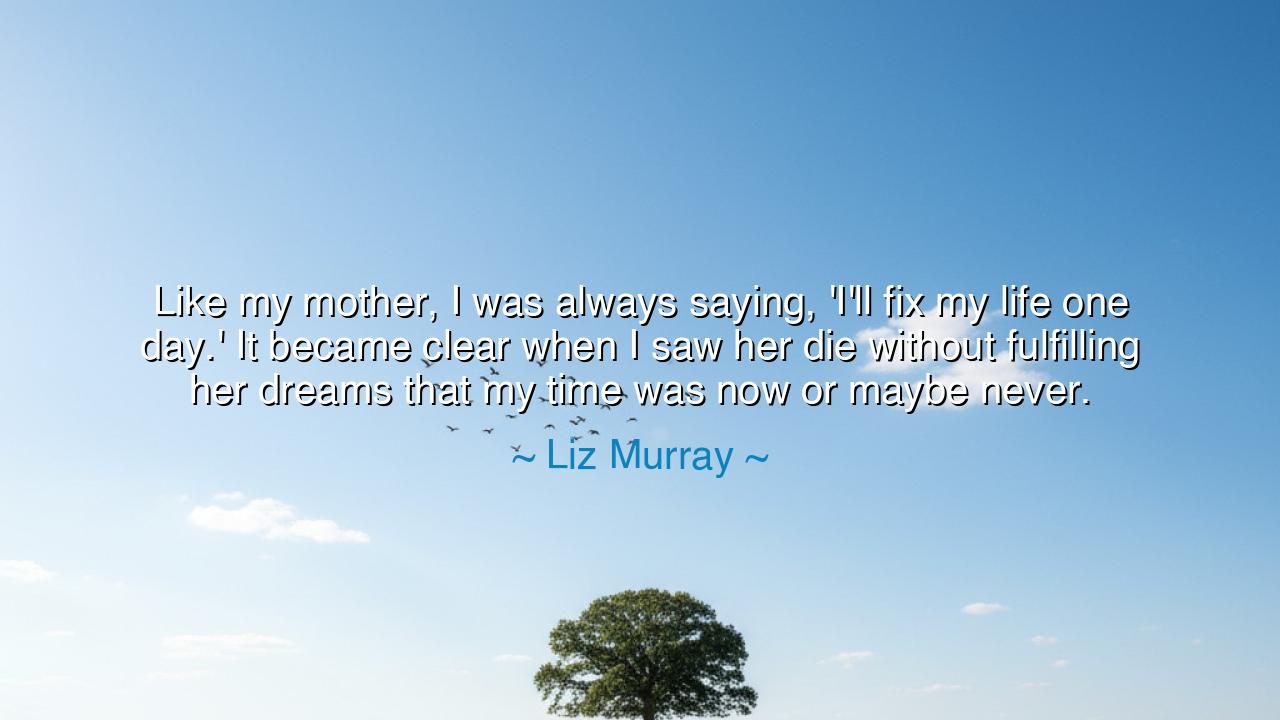
Like my mother, I was always saying, 'I'll fix my life one day.'
Like my mother, I was always saying, 'I'll fix my life one day.' It became clear when I saw her die without fulfilling her dreams that my time was now or maybe never.






When Liz Murray said, “Like my mother, I was always saying, ‘I’ll fix my life one day.’ It became clear when I saw her die without fulfilling her dreams that my time was now or maybe never,” she spoke with the voice of one who had walked through both darkness and awakening. Her words are not the language of theory, but of lived truth — the cry of a soul that has stood at the crossroads of despair and chosen transformation. They remind us of an eternal law of life: that time is a vanishing flame, and those who wait for the “right moment” to change may never find it. Her mother’s death became her mirror, showing her not only the tragedy of wasted dreams, but the fierce urgency of living now.
Liz Murray was not born into ease. Her childhood was marked by poverty, addiction, and homelessness. She grew up in the shadows of neglect, sleeping on subway trains and park benches, often wondering if the world had forgotten her. Yet, from that pit of hardship came a fire — a realization that her mother’s unfinished life was also a warning. Watching her mother die, worn by years of struggle and deferred hope, she saw the cost of saying “one day.” In that moment, she understood that tomorrow is a myth, and that the only time we truly possess is the present. Her story would later become known through her memoir Breaking Night, in which she recounts her journey from the streets of the Bronx to the halls of Harvard University.
In her quote, Murray reveals a truth that has echoed through the ages: that human beings are masters of postponement. We tell ourselves that change will come later — when the pain is less, when the fear subsides, when the path is clear. But life, relentless and swift, waits for no one. The ancients understood this. The Roman philosopher Seneca wrote, “While we wait for life, life passes.” So too did Murray come to realize that to delay one’s dreams is to gamble with fate, for the clock of mortality ticks unseen. Her mother’s unfulfilled hopes were not just her tragedy — they were her daughter’s inheritance, a sacred reminder that the window of action is fleeting.
Murray’s transformation, then, was born not from luck, but from decision — the decision to rise now, not later. In this, her story mirrors that of countless souls who awakened to urgency through loss. Consider Helen Keller, who, after being plunged into darkness and silence as a child, refused to surrender to her fate. With her teacher Anne Sullivan’s help, she learned to speak, to read, to dream — and in time, to inspire the world. Like Liz Murray, she turned limitation into power, and sorrow into resolve. Both women lived by the truth that the pain that breaks us can also be the force that rebuilds us, if only we act before it is too late.
The power of Murray’s words lies in their emotional honesty. “It became clear when I saw her die…” — there is no abstraction here, only the clarity that comes from grief. In that moment, she was stripped of illusion. She saw that dreams without action are like seeds never planted, destined to die in the hand that holds them. Her mother’s unfulfilled life became the threshold of her own awakening. Out of loss, she chose movement; out of despair, she chose creation. It is this transformation — this alchemy of pain into purpose — that turns her quote from sorrow into triumph.
But her message is not only for those who suffer; it is for everyone who hesitates. Each of us, in our own way, repeats her earlier words: “I’ll fix my life one day.” We wait for courage, for certainty, for permission. Yet the truth, as Murray discovered, is that life grants no perfect moment. The door to destiny opens only for those who dare to knock while trembling. To wait is to risk vanishing into the same silence that claimed her mother’s dreams. To act, even in fear, is to honor both life and death — for action is the soul’s answer to mortality.
So take this lesson into your heart: Do not postpone your becoming. Whatever dream whispers in your soul, whatever change you know must be made — begin it now. For as Liz Murray teaches, the moment of readiness is an illusion; there is only the moment of choice. Let the lives unfinished around you remind you, not of despair, but of responsibility — the sacred duty to live fully, so that your story may become a torch for others. Time is not a river that waits; it is a flame that burns. Feed it with courage, with love, with action — before it flickers and fades. For as Murray discovered in her awakening: the promise of someday is the most dangerous lie, and the power of now is the only truth that can save a life.






AAdministratorAdministrator
Welcome, honored guests. Please leave a comment, we will respond soon